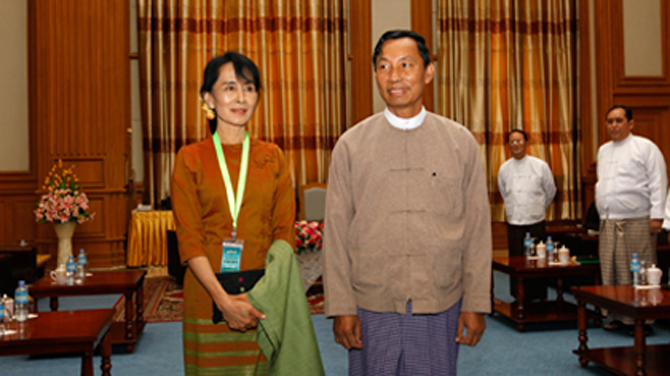RANGOON — Politicians and analysts have welcomed the abrupt decision to establish a committee to review the much-criticized 2008 Constitution, amid speculation that it could help bolster the position of Lower House Speaker Shwe Mann.
Few expected the sudden announcement in Parliament last Friday that a committee of law experts and intellectuals would be formed to review the Constitution to bring it in line with the broader reform process.
Many have speculated that the review will focus on allowing Aung San Suu Kyi to stand for president—or at least vice-president—following the 2015 elections. She is currently barred on the grounds that she has foreign children.
But others believe it could be part of a deal to further the ambitions of Shwe Mann, speaker of the Lower House of Parliament, who is tipped to take over as chairman of the ruling, military-backed Union Solidarity and Development Party (USDP).
The review was proposed by Aye Myint and Thein Zaw, senior members of the USDP. They are considered close confidantes of the parliamentary speaker.
“We welcome the review—no one likes the 2008 Constitution,” said Khin Maung Swe, president of the National Democratic Force, a party formed in 2010 after breaking away from Suu Kyi’s National League for Democracy. “But I think this might be an attempt to help Shwe Mann become president in 2015. Politics is very tricky and nothing should be taken for granted.”
A Western diplomat, speaking on condition of anonymity, told The Irrawaddy last week that he believed some form of back-room agreement has been reached between Suu Kyi and Shwe Mann.
“They feel they can work together—they have some common ground,” said the diplomat. “He is one of the people who has changed the most, and they have a shared interest in strengthening Parliament. She sees it as key to establishing democracy, and he sees it as a potential power base.”
Shwe Mann is a former general who was once labeled “Burma’s dictator-in-waiting” in a US diplomatic cable published by Wikileaks. He has become an unlikely but staunch supporter of democratic reform in the past two years, and is thought to have designs on the presidency.
The need to alter the Constitution has been a constant refrain of opposition groups in Burma since the reform process began, particularly clauses that reserve 25 percent of seats in Parliament for the military, and prevent Suu Kyi from becoming president on the grounds she has foreign children.
“Judging by what has happened in this country in the past two years, anything is possible, so I am no longer surprised by these events,” said Aung Naing Oo, of the Myanmar Peace Center. “Some of the changes have been nothing less than a miracle. Parliament has been very dynamic and is doing its job.”
The question now is how far the review will go in challenging the political grip of the military.
“Compromising with the Burmese generals is the key for success,” said Aung Naing Oo. “Ultimately what we all want is civilian democratic governance, but you can’t leapfrog to democracy overnight. As long we get key aspects like free and fair elections and respect for human rights, we should be happy.”

















